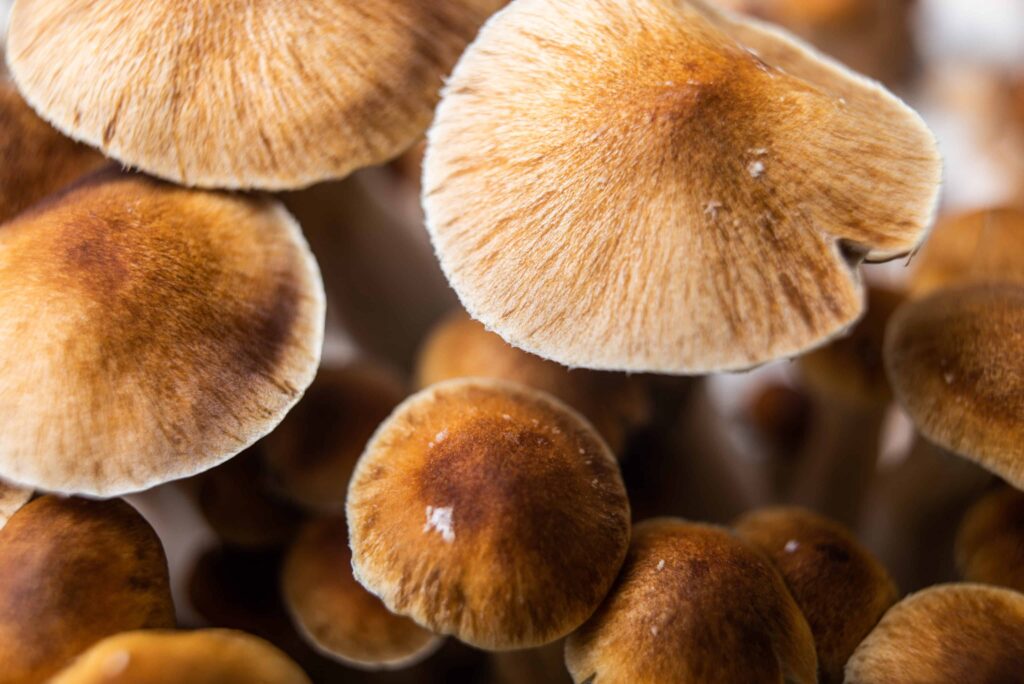
A team of Canadian researchers recently published the results of their newest study in the medical journal Palliative Medicine. The study examined the social acceptability of using psilocybin as an end of life treatment, specifically to treat “existential dread.”
According to study team leader Michel Dorval, who is a researcher at CHU de Québec-Université Laval Research Center and also a Université Laval’s Faculty of Pharmacy professor, previous studies have established the potential benefits of psilocybin for medical use. “Studies have already shown that psilocybin, combined with psychotherapy, produces rapid, robust and lasting anxiolytic and antidepressant effects in patients suffering from advanced cancer,” Dorval told Medical Xpress. “This substance can bring about a profound awareness that leads the patient to view existence from a different perspective. Treatment with psilocybin, combined with psychotherapy, can produce relief for up to six months.”
The study was conducted between November 2022-December 2022 through an online survey with 2,800 Canadians, 1,000 of which lived in Québec, while 1,800 were from Ontario, Alberta, and British Columbia. Questions included: “Have you heard about the Special Access Program?”, “To what extent would you agree that healthcare professionals should be allowed to administer psilocybin without going through Health Canada?”, “Do you think psilocybin is a reasonable choice for a palliative care patient suffering from existential distress?”, “In your opinion, should the public health system cover the costs of psilocybin-assisted therapy?”, “To what extent do you support the legalization of psilocybin for medical purposes?” Participants were also asked to respond to hypothetical situations.
Only 18.7% of participants said that they were aware of the government’s Special Access Program. Psilocybin sale, possession, and production is illegal in Canada, but as of January 2022, the government’s Special Access Program now allows doctors to request for limited access to certain illegal substances if they believe it could help a patient if other methods of treatment have failed.
The results showed that 79.3% of participants see psilocybin use as “reasonable” for those approaching end of life. “Our results seem to indicate that the social acceptability of this intervention is high in the Canadian population,” Dorval explained. “If we consider only Québec respondents, the acceptability rate is similar to the national average.”
Participant’s support was even stronger when considering the social acceptability of patients already underdoing palliative care, which Doval believes could be because they’ve seen someone go through it personally. “Having been close to loved ones at the end of life, or having witnessed their distress, could explain this openness to new approaches designed to help people at this stage of their life,” Doval stated.
Additionally, 44.2% said that healthcare professionals should be able to prescribe psilocybin without going through the government first, 84.4% said Canada’s public health system should cover the costs of such treatment, and 63.3% said they “would welcome” legalizing medical psilocybin.
Additionally, those who have tried psilocybin at some point in their life also showed increased support. “There are still many prejudices against psychedelic substances,” Doval concluded. “Familiarity with these substances probably helps to better understand their true effects as well as their therapeutic potential.”
Researchers on this particular study explained that population-based surveys from elsewhere in Canada, as well as England and Australia, were conducted by interest groups or organizations rather than published in scientific journals. “The results obtained from this survey are timely in the wake of the growing worldwide interest towards psilocybin-assisted therapy,” researchers concluded. “The implications of using this type of intervention to alleviate the existential suffering of patients nearing the end of life are manifest, as evidenced by a recommendation made in February 2023 by the Canadian Special Joint Committee on Medical Assistance in Dying, calling for an improvement of access to this therapy, as part of palliative care supports.”
Acceptability of psilocybin is prominent in the U.S. as well. The legal use of psilocybin in the state of Oregon began in January 2023, and as of December 2023, 715 people have sought out psilocybin centers for treatment.
Earlier this month, the U.S. Department of Veteran Affairs announced that it will be funding studies on psilocybin, as well as MDMA, to examine the effects that those substances have on veterans who suffer from post-traumatic stress disorder and depression.
A study published in Molecular Psychiatry recently explores how Zebrafish (a small fish in the minnow family) and how psilocybin affects them. Research from 2013 shows that humans share 70% of the same genes with Zebrafish, making them useful test subjects. Using machine tracking technology to monitor changes in swimming pattern behavior before and after psilocybin, the fish began to show both stimulatory and anxiolytic movements, or spontaneously exploring and displaying irregular swim patterns associated with stress. Previously in 2022, these researchers performed a similar study with Zebrafish and LSD as well and found evidence that LSD does not create withdrawal symptoms and isn’t addictive.
In even stranger news, a genomic diversity study conducted by the University of Utah and Natural History Museum of Utah found evidence that “psilocybe” originated more than 65 million years ago, which is also the same time frame that an asteroid hit Earth and contributed to planetary mass extinction of dinosaurs.
Read full article on High Times

